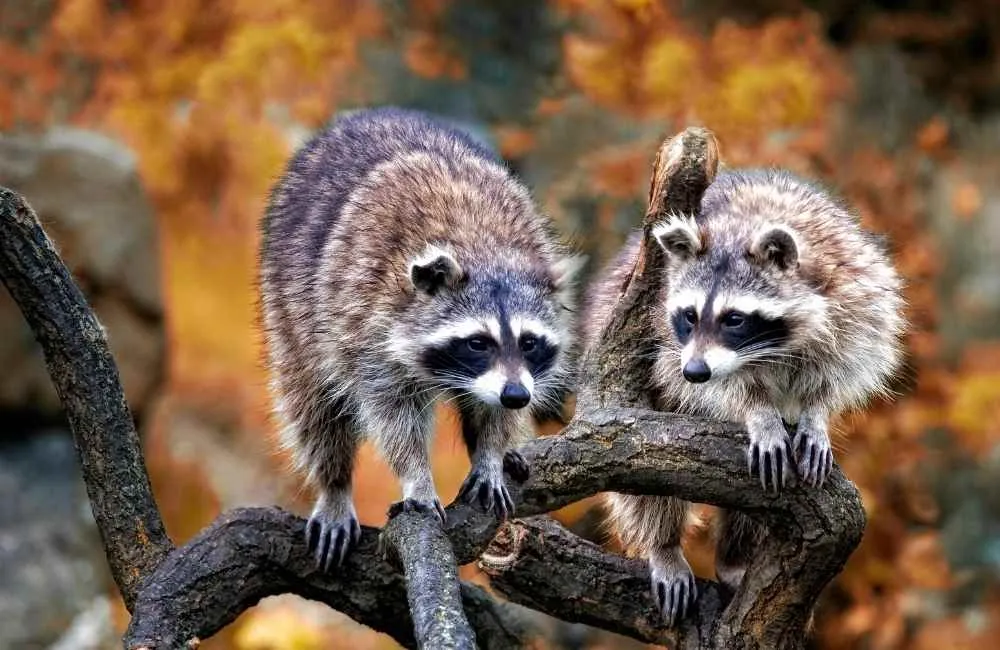Raccoons are adorable scavengers that look like masked bandits. They are known for getting into trash cans and dumpsters around homes and businesses. Did you know that some people even keep raccoons as pets? For decades, raccoons have been kept as exotic pets by suburban families to American presidents.
About Raccoons
Raccoons are medium-sized mammals native to North America. After unintentional (and intentional) introductions, raccoons can also be found in Europe and Asia. They have a “mask” on their face and ringed tails, but most of their body is covered in gray fur. Depending on the area that they live, a raccoon’s size can vary from 10 to 60 pounds. These animals are highly intelligent and have unusually impressive dexterity. Raccoons have been known to break into dumpsters, attics, trash cans, and other spaces they shouldn’t be.
Pros of Owning a Raccoon
You wouldn’t consider a raccoon for a pet unless there were a few good reasons to do so. While there aren’t as many pros as cons, there are a few reasons why raccoons make a good pet.
Unique Pet
Probably the biggest reason that people choose to get a pet raccoon is that they are so unique! You most likely don’t know anyone who has a raccoon in their home. These animals might be commonplace around town, but it is shocking to see one eating out a food bowl in the kitchen.
Quirky Personality
Especially obvious in younger raccoons, these animals are known for their silly antics. This can include behaviors like playing “hide and seek”, cuddling, and wrestling with toys. Their engaging and captivating nature is one of the reasons people see a raccoon as a pet.
Can Be Housetrained
Raccoons can surprisingly be litter box trained (or trained to go to the bathroom outside). Training an exotic animal takes more patience and work than a domestic animal, but it can be done. This makes it easier to clean up after a pet raccoon. The ability to be housetrained also makes raccoons a better pet than other exotic mammals.
Easy to Feed
Raccoons are omnivores, meaning they eat meat and plants. As a pet, they can be fed a variety of meats, produce options, and even dog food. An exotic animal vet can recommend a balanced dog kibble and any necessary additions for a healthy diet. Just be aware that some pet raccoons get too accustomed to living the good life and may end up becoming picky eaters.
Minimal Grooming
Raccoons are extremely clean animals, despite being known as dumpster-divers. They take care of their own grooming regularly. Just like a cat cleans itself, you can also see a raccoon enjoying a mid-day grooming session. Some owners still like to bathe their raccoons at regular intervals. This is more necessary if your raccoon has an outdoor enclosure.
Cons of Owning a Raccoon
The cons seem to outweigh the pros of owning a raccoon. Most of these reasons are because raccoons are wild animals, not domesticated ones.
Wild Animal
This comes as no surprise but raccoons are wild animals. Even ones that have been bred by humans are not truly domesticated. Domesticated animals have lived with humans for centuries and have been bred for many generations to be docile and comfortable with people. Wild animals can be unpredictable and maintain their wild instincts. Raccoons are soft and cuddly but they also have sharp teeth and claws.
Biting is Inevitable
If you ask a zookeeper if a raccoon (or any animal) can bite, you’ll most likely get the response that “any animal with a mouth can bite”. It is entirely true. When raccoons interact with one another, biting is a form of communication. They may be nipping to express frustration or lightly biting during play. Even playful biting can break through human skin and be extremely painful. It is also important to get all raccoon bites checked by a doctor because raccoons can carry zoonotic diseases.
Highly Intelligent
You might think that being smart makes a raccoon a good pet, but that isn’t the case. That intelligence turns into mischievousness when a raccoon is kept as a pet. You’ll need to childproof your home (top to bottom because raccoons are excellent climbers). These animals can get into anything and cause damage to household items.
Nocturnal
If you’ve seen a wild raccoon, you’ve most likely seen it at dusk or night. Since these animals are nocturnal, they are most active overnight. This means you can expect vocalizations and higher activity levels while you are trying to sleep. Since raccoons are naturally active overnight, they will not take well to being confined into an enclosure overnight.
Disease Carriers
Raccoons can carry canine distemper, leptospirosis, toxoplasmosis, and roundworms (among other diseases). These can be transmitted to other pets in the house, like cats and dogs. Most importantly, raccoons are known carriers of rabies. There is no current rabies vaccine for raccoons. That means that if someone is bit or scratched by a pet raccoon, the animal will need to be euthanized to test for rabies.
Sexual Maturity
Many raccoon owners report that their sweet and cuddly raccoon turns into a completely different animal after a couple of years. This is due to the animal reaching sexual maturity. At this point, males have higher testosterone. This hormone increases aggression and exploration in search of females. Females will also have a change in behavior around this time. To prevent behavioral changes around sexual maturity, your raccoon should be spayed or neutered.
Illegal in Many Areas
Only a few states allow legal ownership of raccoons. Additionally, you’ll most likely need special permits in areas that do allow them. To avoid breaking the law, check with your local exotic or wild animal laws before considering a pet raccoon. If you are not allowed to own a raccoon, authorities can impose fines, press charges, or remove the animal from your home.
Damage to Your Home
With sharp teeth, long claws, and dexterity similar to a human, raccoons can cause a lot of damage for their small size. Fabric, wood, carpet, and many more materials can be easily torn apart by a raccoon. Even when they are not trying to cause damage, accidents can happen as they explore their environment. Additionally, if you have any issues with potty training your raccoon, you can expect urine and feces to stain or damage your flooring.
Need Lots of Space
A raccoon will not be happy if confined to a small enclosure or even a single room. Since these animals are so smart, they like to explore and investigate the world around them. If you are only keeping your raccoon indoors, it will want to have the run of the house. An outdoor enclosure will need to resemble a large aviary and have reinforced doors and locks.
Escape Artist
Harry Houdini would be impressed with the things that raccoons can get into or out of. Small locks, closed lids, and puzzles can all be figured out by a smart raccoon. This means that securing them in one space can be difficult. Most people don’t realize that raccoons have impressive dexterity in their hands and fingers. They can use them similarly to a human’s hand to open doors and locks.
Dangerous to Other Pets
You should be especially cautious of getting a pet raccoon if you have other pets in the house. A young raccoon may enjoy interacting with a cat or dog, but that same pet can be seen as a rival to the raccoon after sexual maturity. Additionally, cats and raccoons are similar in size and can end up fighting over food. Raccoons can also carry many different diseases that can be passed onto your other furry pets.
Exotic Animal Veterinarian
Even though they can be found by the neighborhood dumpster, raccoons are considered exotic animals because they are not domesticated. This means you will need to have a specialized exotic animal vet to care for your raccoon. These vets are not as common as small animal vets and they can be more expensive.
Hard to Find a Pet Sitter
If you ever want or need to travel, someone will need to care for your raccoon. It can be easy to find someone to watch your dog or cat or goldfish, but it will be much harder to find a pet sitter for your raccoon. Some people won’t even want to try and others won’t be qualified to care for an exotic animal.
Should You Own a Pet Raccoon?
Probably not. There are so many wonderful pets out there (especially rescue dogs and cats) that you really don’t need a pet raccoon. Even if you find them cuddly and adorable, the cons outweigh the pros. These animals can create a mess in your home, be aggressive or unruly, and carry dangerous diseases. It is best to admire the raccoon climbing out of your trash can instead of welcoming one into your home.
Related Articles:


